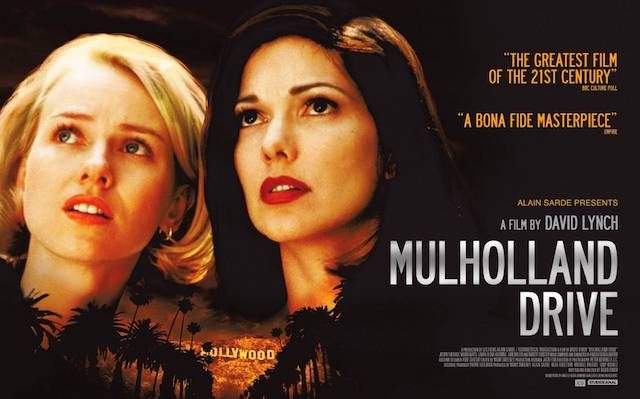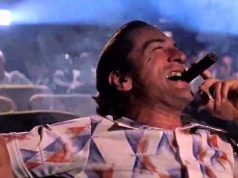
One of the lamest things a critic can do is to play the “emperor’s new clothes” card. That’s where you assert that not only is the film bad, but that anyone who says otherwise is either deluding himself or pretending to like it because he thinks he’s supposed to. That is a terrible argument to make. And I say that as someone who has made it before.
It shows up in my review of David Lynch’s “Mulholland Drive,” which I called “a smug attempt by Lynch to see if people will proclaim him a genius just because they’re afraid to admit they didn’t get it.” See, that’s a jerky thing to say. You’re treading on dangerous ground any time you presume to interpret another person’s opinions (“You only like it because of X!”), and especially if you issue a broad, sweeping statement like this one. I was basically saying that anyone who claims to find meaning in “Mulholland Drive” is lying. What kind of a-hole says that?
In my defense, I was young(er), brasher, and more of a general know-it-all in those days. Also — and this is key — I grew out of it. Some of my colleagues have not. Let me tell you, there is no surer way to announce to your readers that you are either young and arrogant or old and befuddled than to say, “This movie makes no sense! If you like it, you must be a pretentious poser!” (For example, see Rex Reed’s hilariously dumb review of “Inception.”)
Let me be clear here. People do sometimes convince themselves that they like something more than they really do. It’s human nature to occasionally go along with the crowd because you don’t want to seem like the one who didn’t “get” it. That’s why there’s a famous story called “The Emperor’s New Clothes,” duh. But you can’t go around accusing people of that. The only civil thing to do when people offer their opinions is to take them at their word that they have arrived at those opinions honestly and for the reasons they give.
This becomes shockingly obvious when you’re on the other side of it — when you’re the one raving about how brilliant something is and people on the Internet are accusing you of exaggerating to seem hip. YOU know you’re telling the truth — you really did love “The Tree of Life”! Honestly! It moved you! — so HOW DARE these cretins impugn your integrity by suggesting otherwise??
All you can do is describe your opinion and try to explain what contributed to it. To psychoanalyze other people’s opinions by searching for hidden motives or unspoken biases is arrogant. Think about it: Just because you didn’t find any value in a particular movie doesn’t mean there is no value to be found. There obviously is value to be found, because people are finding it.
Now, you can certainly debate the specifics. You can say that the meaning someone has gotten from a film isn’t justified by what’s actually on the screen, or that the examples they cite don’t mean what they think they mean. You can question how valuable the “value” they’re finding really is. (“It has a ton of really cool explosions!” is not, by itself, a point in the plus column for me.) But what you can’t do — at least not with intellectual honesty — is say, “You don’t really think what you’re saying you think.”
What I said then:
“‘Mulholland Drive’ is a lot like a dream. It’s random, it makes very little sense, and it refuses to answer most of the questions a viewer might have…. Nonsense is fun for a few minutes, but not for 2 1/2 hours…. It’s a bait-and-switch, a frustrating lesson in movie tedium. You put a bunch of intriguing ideas on the screen to pique our interest … and then intentionally leave them unresolved!… [It’s] merely a smug attempt by Lynch to see if people will proclaim him a genius just because they’re afraid to admit they didn’t get it… The guy is self-indulgent to the point of irritation. For crying out loud, if nothing’s happening, quit showing it to us…. If I had any hope the movie could be unraveled by paying careful attention to it, I’d watch it again and try to figure it out…. [But] there’s no chance of understanding this one, no matter how hard you try. The movie doesn’t want anyone to understand it. To make sure of that, it removes several key pieces before it even hands us the puzzle.” Grade: C-
Wow, I want to go back to 2001 and punch me. I’d like to go back to 2001 for a number of other reasons, too, but punching me would definitely be high on the list.
How could I claim after one viewing that it would be impossible to understand it after multiple viewings? That doesn’t even make logical sense. The only way to know would be to watch it multiple times.
The re-viewing:
I do like David Lynch (or at least the idea of David Lynch) in general, and I’ve heard people defend the film over the last decade, and I am not above admitting when I am wrong. This is what makes me a better person than so many of you.
It turns out I was right in a way. While “Mulholland Drive” is open to a variety of plausible interpretations, none of them is definitively the “correct” answer to the exclusion of all the others, and Lynch won’t elaborate. The prevailing theory (spoilers here) is that most of the film is Naomi Watts’ dream of being a plucky young actress, when in fact she’s a failed actress jealously in love with her brunette friend. That makes sense to me. Many of the film’s details support that theory, and I can’t think of anything that contradicts it.
But I’m not gonna lie to you: I don’t know how many times I’d have had to watch the movie to come up with that solution on my own.
Anyway, where I was wrong was in suggesting that the disregard for the usual conventions of storytelling makes it a bad film. Plenty of very good movies go against the grain — and so do plenty of bad ones, to be sure. But if it’s clear that the filmmaker is doing what he’s doing intentionally, that he has some purpose in mind, then there’s no reason to be a stickler about “rules.” My problem here was that it wasn’t clear to me that Lynch was doing anything other than being weird for weirdness’ sake.
What I should have done the first time around is give Lynch the benefit of the doubt. I should have at least entertained the possibility that if the movie didn’t make sense, it was because I was failing to get it, not because Lynch was incompetent. Of course, I could have been failing to get it because Lynch had failed to convey whatever it was he wanted me to get. It could have been his fault entirely. That happens often enough. But a humbler critic would have considered the notion that there was more to the film than he saw at first glance, rather than jumping to the conclusion that the whole thing was a pretentious and meaningless wankfest.
Do I still hate this movie?
It isn’t my cup of tea, and I’m in no hurry to watch it again anytime soon, and it feels painfully overlong to me. But I have a better sense of what it’s about — I “get” it more — so I’m no longer frustrated and angered by it. More importantly, I accept that there are people for whom it is genuinely enthralling and meaningful, even if I’m not one of them. I’d put it in the “respect but don’t particularly enjoy” category, next to Jane Austen books and sit-ups. Grade: B-
P.S. Rex Reed hated “Mulholland Drive,” too.




